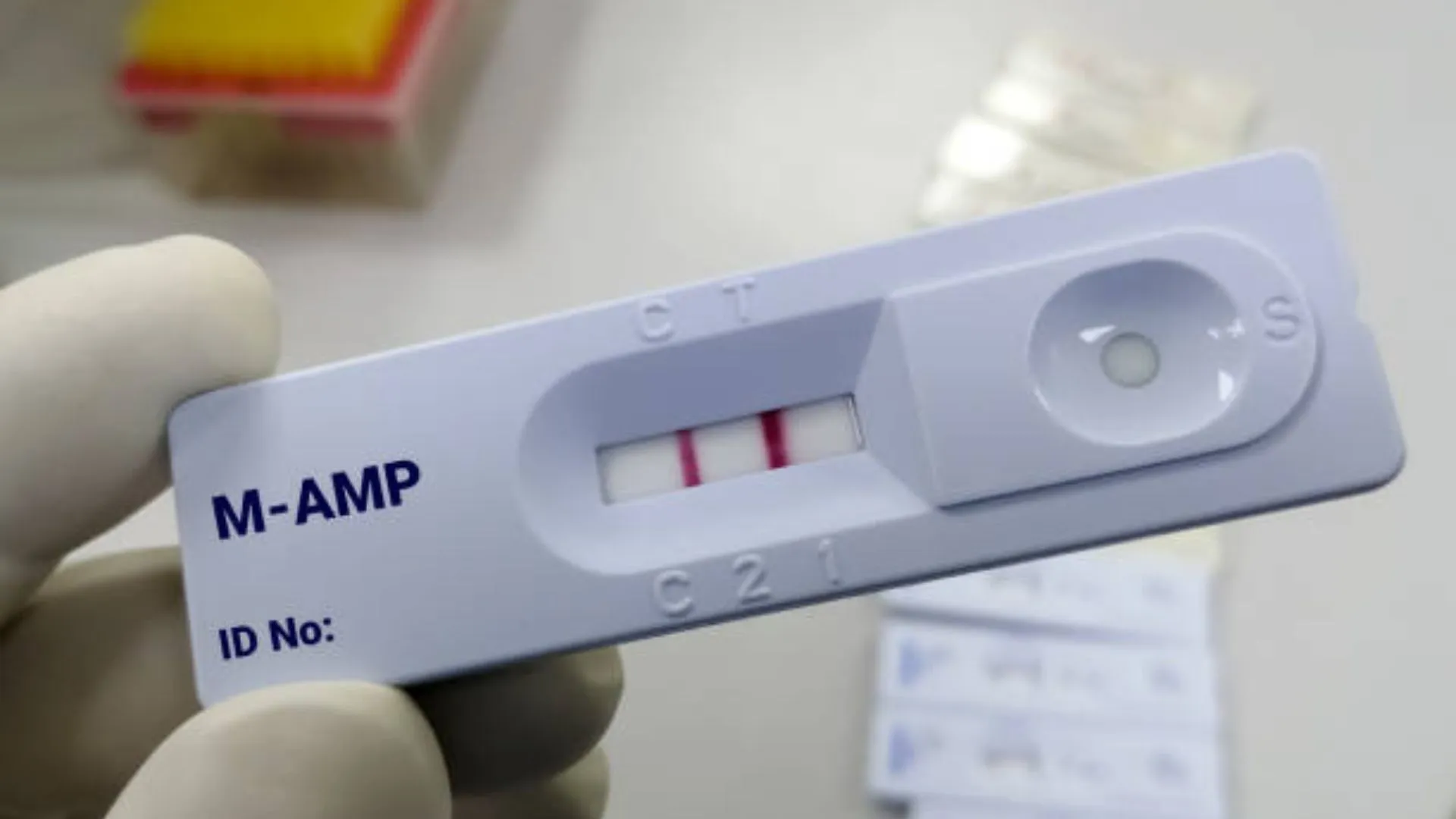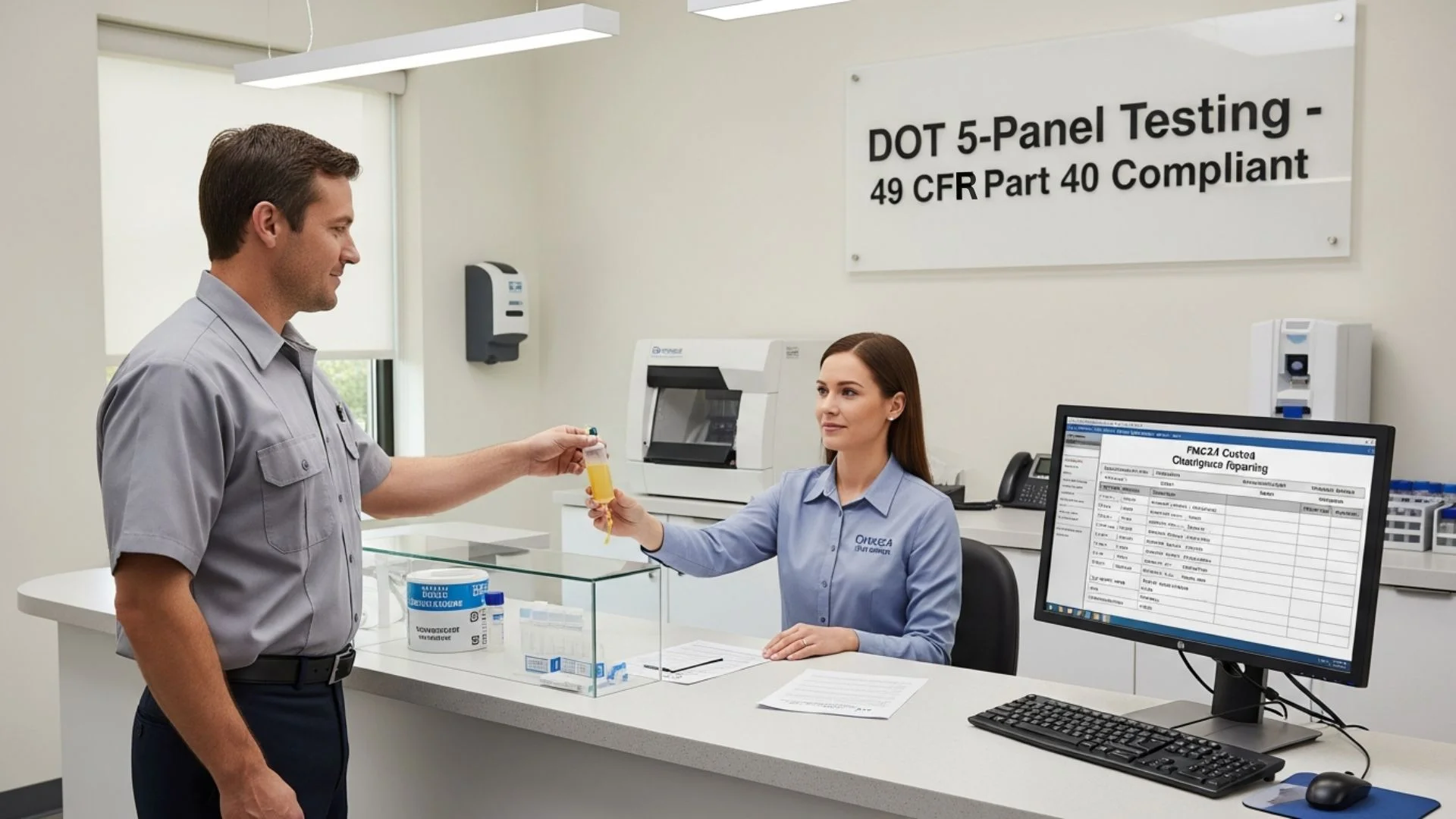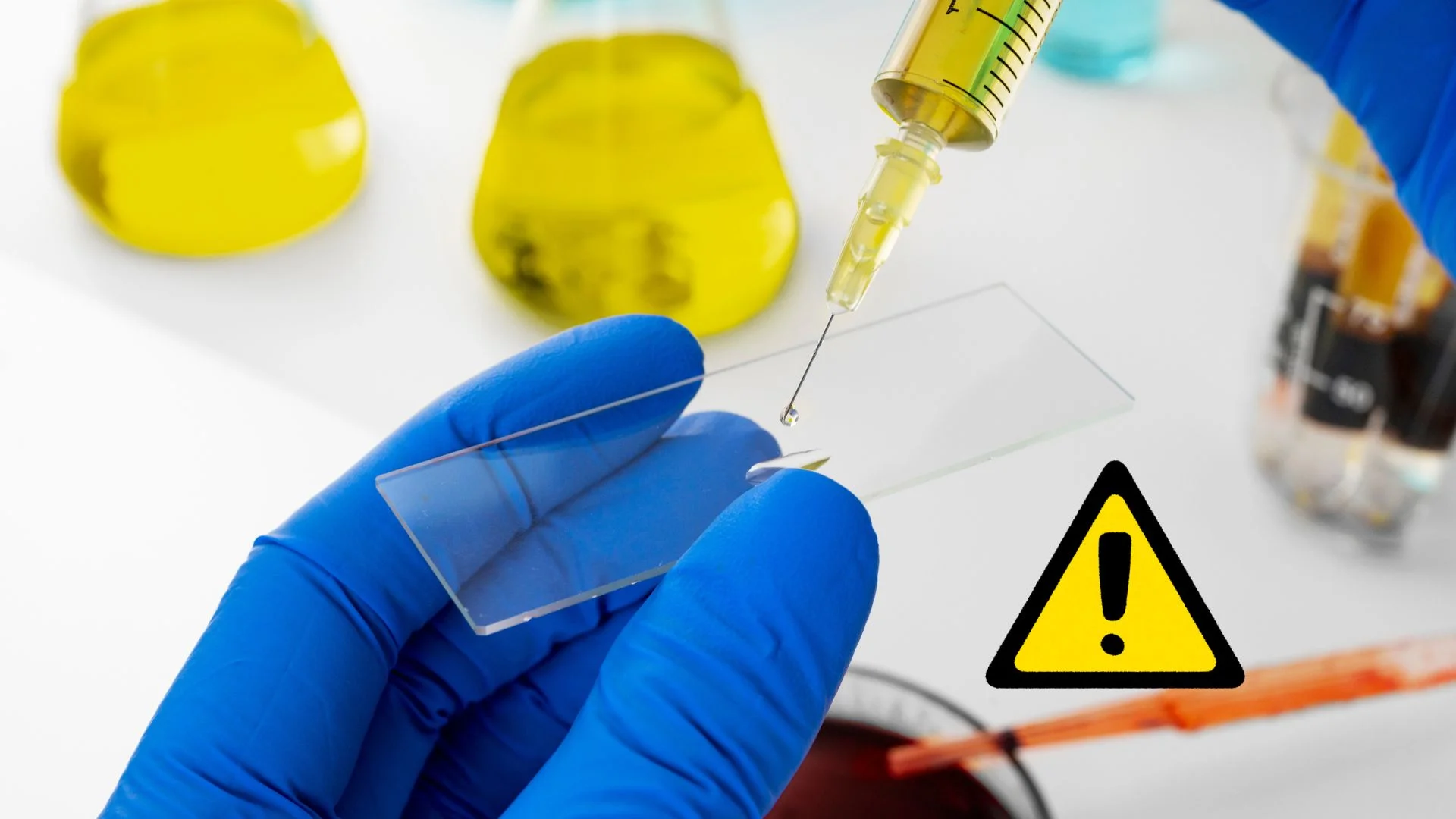If you are an employer looking to expand your team or a job seeker preparing for pre-employment screening you’ve likely encountered workplace drug testing policies. One common result that raises questions is “AMP” on a drug test. But what does it actually mean, and why is it important?
In drug testing, AMP refers to amphetamines, a class of stimulant drugs that are commonly screened for in workplace drug tests. Amphetamine testing is standard in most DOT and non-DOT drug test panels, including 5-panel and 10-panel drug tests.
With goMDnow, you can easily order an amphetamine drug test online or find a certified testing location near you from our 20,000+ nationwide centers, ensuring fast, reliable, and compliant results.
This content is provided by educational purposes and reflects standard workplace and DOT drug testing practices. Medical and legal decisions should always be made in consultation with qualified professionals.
What Is AMP on a Drug Test?
AMP on a drug test indicates the presence of amphetamines in the body. Amphetamines are classified as Schedule II controlled substances, meaning they have legitimate medical uses but also carry a high potential for abuse and addiction.
Drug tests screen for amphetamines because misuse can significantly impair judgment, reaction time, and workplace safety especially in safety-sensitive roles such as trucking, construction, healthcare, and manufacturing.
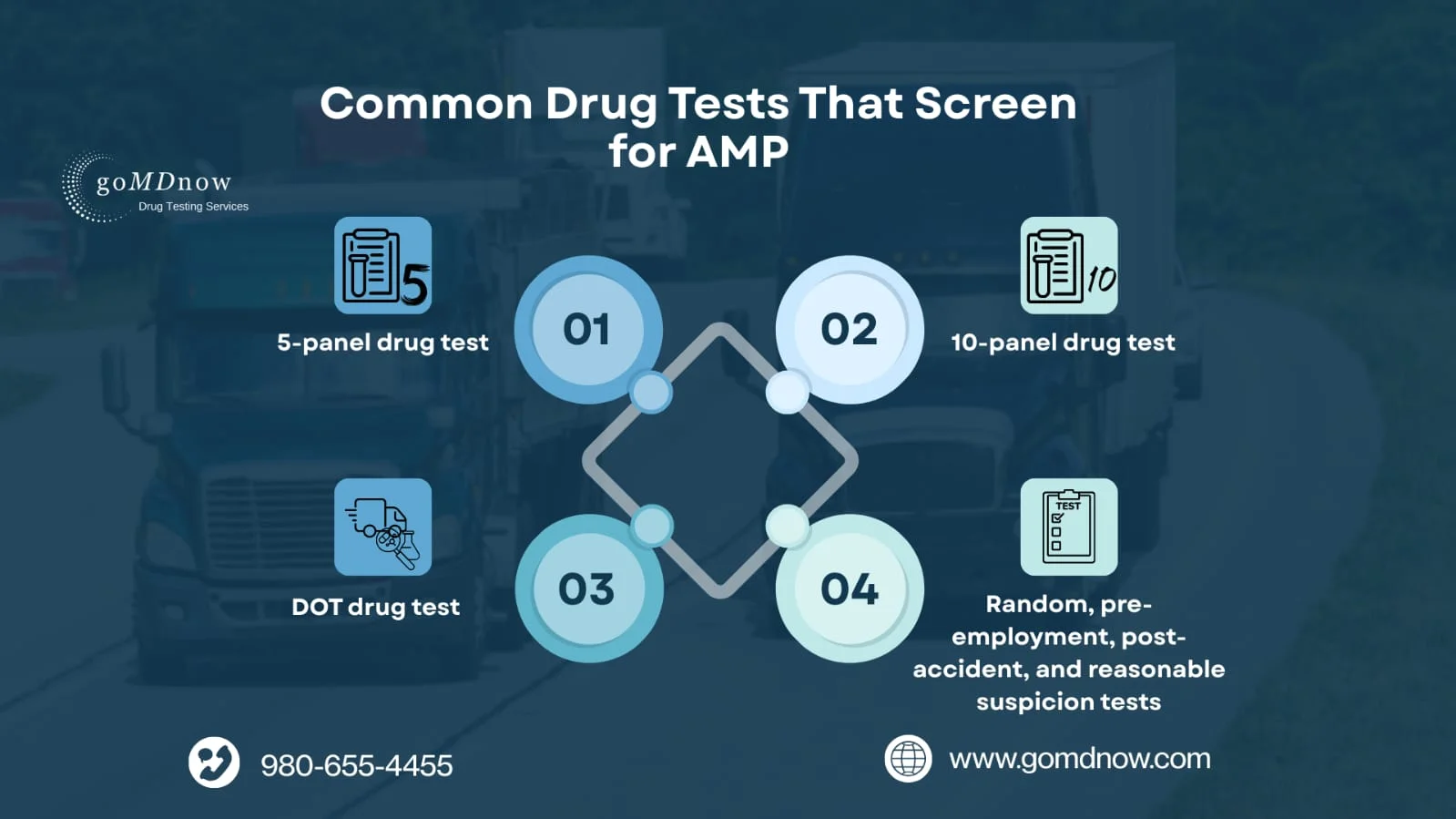
Common Drug Tests That Screen for AMP
- 5-panel drug test
- 10-panel drug test
- DOT drug test
- Random, pre-employment, post-accident, and reasonable suspicion tests
What Is Amphetamine?
Amphetamine is a central nervous system (CNS) stimulant that affects chemicals in the brain responsible for alertness, focus, and impulse control. It works by increasing levels of dopamine and norepinephrine, which results in heightened energy, concentration, and wakefulness.
Medical Uses of Amphetamine
Amphetamines may be legally prescribed to treat:
- Attention Deficit Hyperactivity Disorder (ADHD)
- Narcolepsy
- Certain cases of obesity (short-term use)
Common prescription medications that may contain amphetamine include Adderall and Dexedrine.
Illicit Use
Outside medical supervision, amphetamines are often misused as recreational drugs, commonly known as:
- “Speed”
- “Uppers”
- “Bennies”
Illicit use significantly increases the risk of addiction, mental health disorders, and physical harm.
What Are the Side Effects of Amphetamines?
Amphetamine use especially misuse can cause both short-term and long-term side effects that impact physical health, mental well-being, and workplace performance.
Short-Term Side Effects
- Increased heart rate and blood pressure
- Increased alertness and energy
- Excessive sweating
- Dilated pupils
- Loss of appetite
- Anxiety or agitation
- Paranoia
- Aggressive behavior
- Psychosis
Risk of Overdose
High doses or prolonged use can result in overdose, which may lead to:
- Stroke
- Heart attack
- Seizures
- Sudden death
Long-Term Side Effects of Amphetamine Use
- Persistent high blood pressure
- Damage to vital organs (heart, brain, liver, kidneys)
- Chronic insomnia
- Digestive issues
- Severe dental problems (“meth mouth”)
- Skin sores and infections
- Memory loss and reduced concentration
- Increased risk of addiction and dependence
These risks highlight why amphetamines are closely monitored in workplace drug testing programs, especially methamphetamine in DOT-regulated industries.
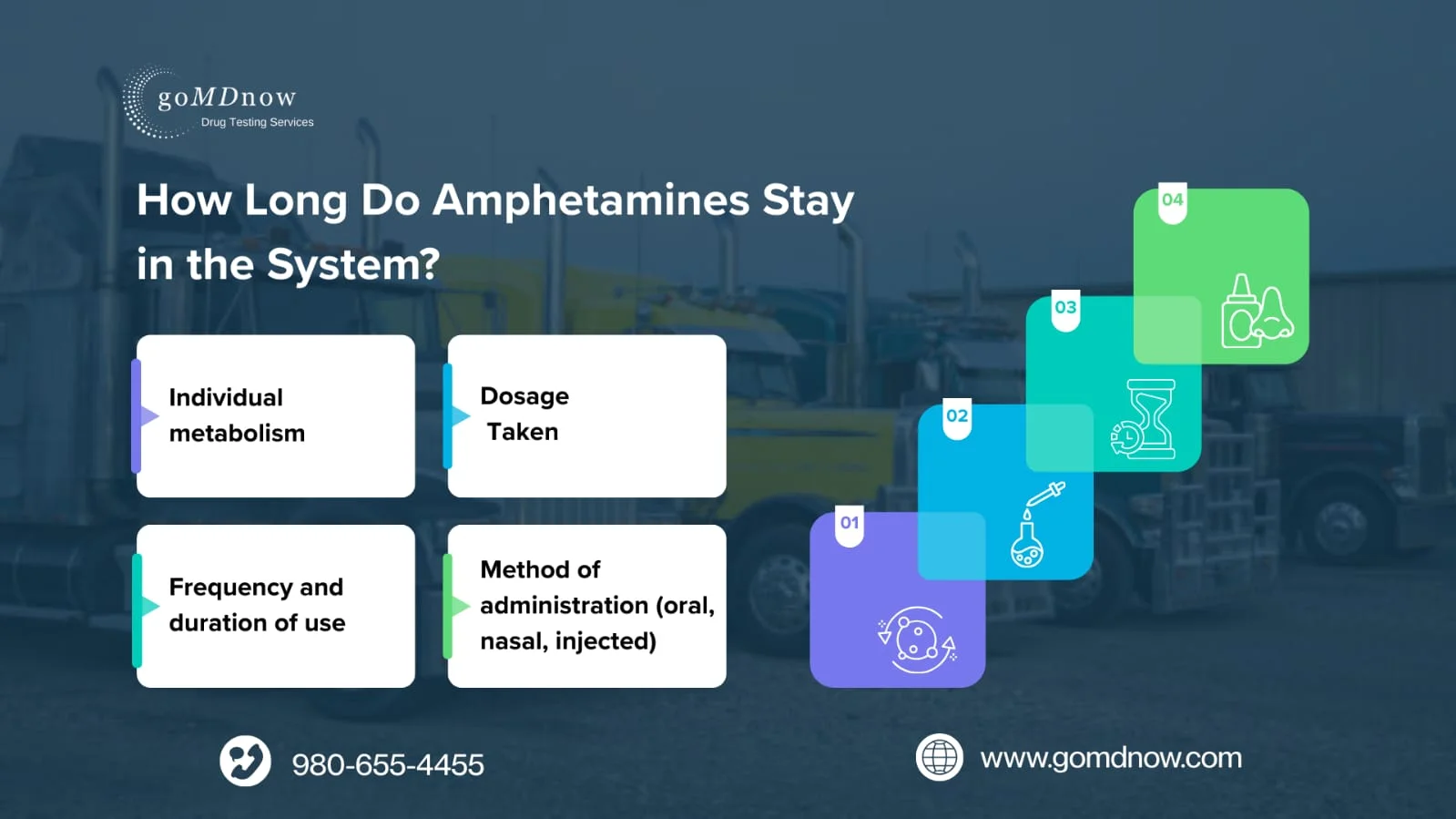
How Long Do Amphetamines Stay in the System?
The detection window for amphetamines varies depending on several factors, including:
- Individual metabolism
- Dosage taken
- Frequency and duration of use
- Method of administration (oral, nasal, injected)
On average, amphetamines have a half-life of approximately 10–12 hours, meaning half of the drug is eliminated from the body during that time. However, traces can remain detectable longer.
How Long Can Amphetamine Be Detected on a Drug Test?
Amphetamine Detection Times
- Urine test: Up to 3 days after last use
- Blood test: Up to 12–24 hours
- Saliva test: Up to 48 hours
- Hair test: Up to 90 days
Urine testing is the most common method used by employers due to its accuracy, affordability, and standardized cutoff guidelines. Detection times may vary based on dosage, frequency of use, metabolism, and individual health factors.
You can order an AMP drug test online through goMDnow for fast and confidential results.
AMP on a Drug Test: What Does It Mean for Employers?
When an employee or applicant tests positive for amphetamines, employers must follow strict procedures especially for DOT-regulated testing.
Key Employer Steps After a Positive AMP Result
Medical Review Officer (MRO) verification
A certified MRO reviews the result to determine if a legitimate prescription explains the finding.
Prescription Verification
If the individual has a valid prescription, the test may be reported as negative.
Policy Enforcement
If no valid prescription exists, employers may take disciplinary action according to company policy. For DOT-regulated employees, positive results trigger specific procedures including SAP evaluation and return-to-duty requirements:
- Mandatory treatment or counseling
- Suspension
- Termination
Having a clear drug-free workplace policy protects employers from legal risks and promotes a safer work environment.
Can Prescription Amphetamines Cause a Positive Drug Test?
Yes. Legally prescribed amphetamines can trigger a positive AMP result. However, this does not automatically mean disciplinary action. A verified prescription does not exempt DOT-regulated drivers in safety-sensitive positions from compliance requirements. Learn more about stimulant use and DOT compliance.
Employees must disclose prescriptions to the Medical Review Officer, not their employer, to maintain privacy. If verified, the result is typically reported as negative.
Why Amphetamine Drug Testing Matters
- Improve workplace safety
- Reduce accidents and liability
- Maintain productivity
- Ensure compliance with DOT and federal regulations
For safety-sensitive industries, routine amphetamine screening is essential to protect both employees and the public while maintaining DOT compliance.
Why choose goMDnow for Amphetamine Drug Testing?
Our Advantages
- Order amphetamine drug tests online
- Access 20,000+ testing locations nationwide
- Fast, accurate, and confidential results
- DOT and non-DOT compliant testing
- Employer and individual-friendly solutions
Whether you’re an employer managing compliance or an individual needing a test, goMDnow provides trusted testing solutions you can rely on. Content reviewed by goMDnow compliance specialists with experience in DOT and non-DOT workplace drug testing programs.
Frequently Asked Questions
Is AMP the same as methamphetamine on a drug test?
AMP indicates amphetamines, which may include prescription drugs or illicit substances depending on laboratory confirmation.
Can ADHD medication cause an AMP positive result?
Yes. Medications like Adderall may trigger AMP results and require MRO verification.
Does a positive AMP test automatically mean termination?
No. Employer action depends on prescription verification, DOT rules, and company policy.
Conclusion:
AMP on a drug test means amphetamines have been detected, which can have serious implications depending on workplace policies and medical authorization. While amphetamines have legitimate medical uses, misuse can lead to addiction, health complications, and employment consequences.
If you suspect amphetamine abuse or need accurate testing, early action is critical. Amphetamine abuse is treatable through proper SAP evaluation and return-to-duty procedures, and proper testing is the first step toward safety and recovery.
Order your amphetamine drug test online with goMDnow today or locate a testing center near you for fast, reliable results.

